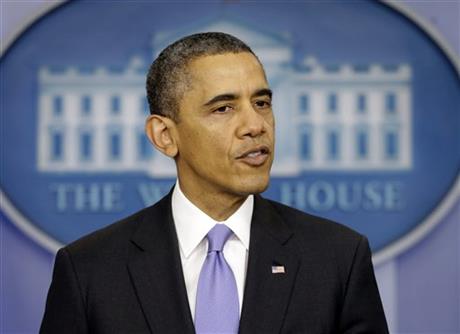
By JULIE PACE
FILE – In this Dec. 20, 2013 file photo, President Barack Obama speaks during an end-of-the year news conference in the Brady Press Briefing Room at the White House in Washington. Capping a monthslong review, Obama is expected to back modest changes to the government’s surveillance network at home and abroad while largely leaving the framework of the controversial programs in place, including the bulk collection of phone records from millions of Americans. (AP Photo/Pablo Martinez Monsivais, File)
Barack Obama
President Barack Obama speaks in the South Court Auditorium in the Eisenhower Executive Office Building on the White House complex, Thursday, Jan. 16, 2014, in Washington. Faced with Edward Snowden’s first secret surveillance leaks, President Barack Obama’s message to Americans boiled down to this: trust me. But as the disclosures piled up, it became clear to the president that the public’s confidence in the government’s oversight of the spying programs was shaky. That jarring realization spurred a months-long White House review that will culminate Friday with new recommendations aimed in part at restoring the public’s trust in a surveillance apparatus expected to remain largely in place. (AP Photo/Carolyn Kaster)
Prev 1 of 2 Next
WASHINGTON (AP) — Seeking to calm a furor over U.S. surveillance, President Barack Obama on Friday called for ending the government’s control of phone data from hundreds of millions of Americans and immediately ordered intelligence agencies to get a secretive court’s permission before accessing such records. Still, he defended the nation’s spying apparatus as a whole, saying the intelligence community was not “cavalier about the civil liberties of our fellow citizens.”
The president also directed America’s intelligence agencies to stop spying on friendly international leaders and called for extending some privacy protections to foreign citizens whose communications are scooped up by the U.S.
Obama said the U.S. had a “special obligation” to re-examine its intelligence capabilities because of the potential for trampling on civil liberties.
“This debate will make us stronger,” Obama said during a highly anticipated speech at the Justice Department. “In this time of change, the United States of America will have to lead.”
Obama’s announcements capped the review that followed former National Security Agency analyst Edward Snowden’s leaks about secret surveillance programs. If fully implemented, the president’s proposals would lead to significant changes to the NSA’s bulk collection of phone records, which is authorized under Section 215 of the USA Patriot Act.
Even with Obama’s decisions, key questions about the future of the surveillance apparatus remain. While Obama wants to strip the NSA of its ability to store the phone records, he offered no recommendation for where the data should be moved. Instead, he gave the intelligence community and the attorney general 60 days to study options, including proposals from a presidential review board that recommended the telephone companies or an unspecified third party.
Privacy advocates say moving the data outside the government’s control could minimize the risk of unauthorized or overly broad searches by the NSA. However, the phone companies have balked at changes that would put them back in control of the records, citing liability concerns if hackers or others were able to gain unauthorized access.
There appeared to be some initial confusion about Congress’ role in authorizing any changes. An administration official said Obama could codify the data transfer through an executive order, while some congressional aides said legislation would be required.
Congress would have to approve another proposal from the president that would establish a panel of outside attorneys who would consult with the secretive Foreign Intelligence Surveillance Court on new legal issues that arise. The White House says the panel would advocate for privacy and civil liberties as the court weighed requests for accessing the phone records.
The moves are more sweeping than many U.S. officials had been anticipating. People close to the White House review process say Obama was still grappling with the key decisions on the phone record collections in the days leading up to Friday’s speech.
Obama briefly mentioned Snowden, whose disclosures led to controversy both at home and abroad.
“The sensational way in which these disclosures have come out has often shed more heat than light, while revealing methods to our adversaries that could impact our operations in ways that we may not fully understand for years to come,” Obama said.
While the president has said he welcomed the review of the nation’s sweeping surveillance programs, it’s all but certain the study would not have happened without the leaks. Snowden faces espionage charges in the U.S. but is currently living in Russia, where he was granted temporary asylum. Some privacy advocates have pressed Obama to grant him amnesty or a plea deal if he returns to the U.S., but the White House has so far dismissed those ideas.


